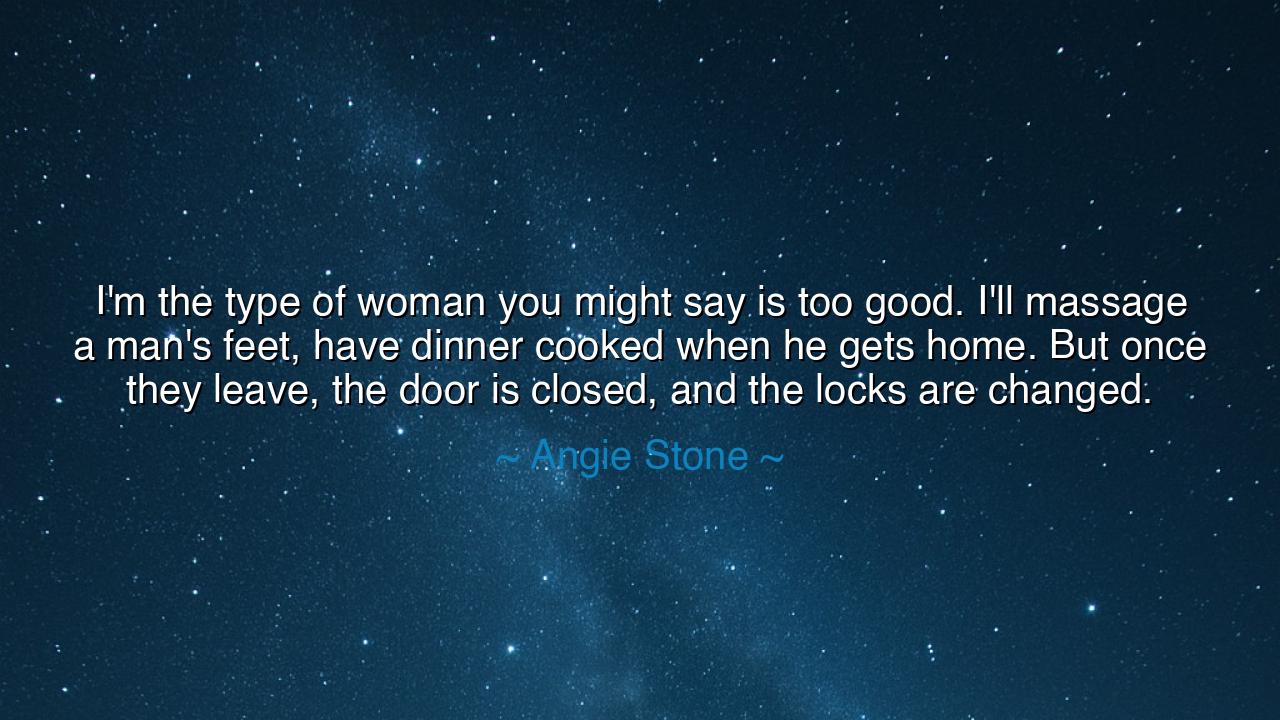
I'm the type of woman you might say is too good. I'll massage a
I'm the type of woman you might say is too good. I'll massage a man's feet, have dinner cooked when he gets home. But once they leave, the door is closed, and the locks are changed.






In the quiet ledger of giving and boundaries, a singer lays down her law: “I’m the type of woman you might say is too good. I’ll massage a man’s feet, have dinner cooked when he gets home. But once they leave, the door is closed, and the locks are changed.” So speaks Angie Stone, and her sentence moves like a psalm with a steel spine. It names the paradox of radiant generosity paired with non-negotiable self-respect. The first half of the line is warmth—hospitality, tenderness, the ancient rites of care. The second half is granite—boundary, consequence, the sacred right to one’s own threshold.
Hear the wisdom beneath the velvet. To be called “too good” is the world’s way of misreading abundance as naïveté. But Stone’s kindness is not servitude; it is chosen, seasoned, and sovereign. Massaging feet and cooking dinner are not capitulations; they are arts of love freely offered—until they are met with disregard. Then the ritual changes. The door is closed; the locks are changed. The house returns to the one who keeps it. This is the old teaching of the hearth: hospitality ends where harm begins; compassion without boundary is a leaking jar.
Consider the origin of such resolve. It is born where women have long been praised for their patience and punished for their standards. Stone’s line reorders the proverb: first, be lavish in goodness; second, be swift in clarity. The boundary does not cancel the blessing; it preserves it. Like the temple curtains that protect the inner room, the closed door is not a sign of coldness but of consecration. What is holy is tended. What refuses to honor the holy is dismissed.
Let a story walk beside the quote, sandal to sandal. In Harlem, a seamstress named Lila fed a trumpet player who seldom kept time with his promises. She cooked dinner, pressed his shirts, and soothed his tired feet after late gigs. When he began to mock her craft and vanish with rent money, she did not break into vengeance. She set one plate on the table—her own—paid the landlord in full, and placed his suitcase by the stairs. When he returned at dawn to find the locks changed, he found also a note: “I wish you well. My kindness remains; your access does not.” Years later, he credited that threshold for his sobriety; she credited it for her peace. Generosity had not made her a fool; it had made her free.
History keeps a larger mirror. Abigail Adams, writing to her husband across the ocean of war, poured out food and comfort for a fragile new nation—yet her letters carried iron: “Remember the ladies.” Care and boundary in one breath. Or think of Aretha Franklin, whose music anointed multitudes while her contracts demanded payment in cash—door closed, locks changed—until respect was shown. These women taught the same liturgy Stone sings: give with both hands, but keep the keys.
What lesson, then, do we pass to our daughters and sons? That love is not proven by how much disrespect it can endure, but by how well it protects the conditions under which love can flourish. That being “too good” is no sin when goodness walks with discernment. That a closed door is sometimes the only sermon a heedless guest can hear. And that dignity does not compete with tenderness; it completes it.
Take these counsels as traveling provisions. (1) Define your thresholds in calm weather—what earns welcome, what earns distance. (2) Give with intention, not to purchase affection; let dinner cooked and feet massaged be gifts, not debts. (3) Keep a boundary ritual—a phrase, a friend to call, a plan—so that when respect is breached, you can close the door without rage and change the locks without regret. (4) Practice reciprocal care: praise what is cherished, address what is harmful at the first ember, not the wildfire. (5) Teach your circle that access is a privilege maintained by honor. Do this, and your home will remain a sanctuary where kindness is abundant, and your keys will remain in the hands that know their worth.






AAdministratorAdministrator
Welcome, honored guests. Please leave a comment, we will respond soon